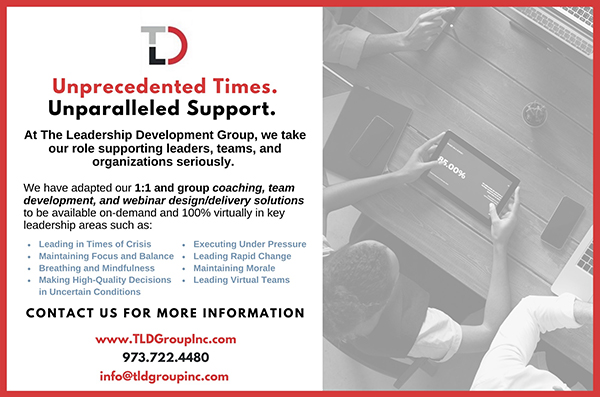By Tracy Duberman, PhD, PCC
President and Founder of The Leadership Development Group
During unprecedented and tumultuous times like these there is no such thing as ‘simple’ solutions. Crisis Management is complex and difficult. Now more than ever, strong leadership is an essential factor in mobilizing and motivating teams to successfully navigate the rapidly changing landscape created by the COVID-19 pandemic, while still aiming to achieve the business objectives front-line leaders are ultimately responsible for delivering.
Whether you are leading a team or are an individual contributor, you may find yourself experiencing increased disorganization, difficulty concentrating, feelings of overwhelm, and increased uncertainly—all of which are normal responses during a period of prolonged disruption and rapid change. Our experience suggests that management and leadership skills need to look and feel different under these types of circumstances. As such, we offer the following supportive techniques for leaders and teams:
- Put your own Oxygen Mask on Before Helping Others
The ‘unknowns’ associated with disruption and change can spawn panic and anxiety, both of which have been demonstrated to negatively impact the ability to long-term plan, calculate the consequences of risk and reward, regulate emotions, problem-solve, and make quality decisions. During periods of disruption, it is important to take care of yourself and seek out help if and when you need it. Remember, as leaders we can only make decisions based on what we know, and adapt and adjust as needed when new information comes in. Relieving the burden of having to predict the unknowable can help you to execute sound decision-making in the here-and-now.
2. Practice “Mindful Leadership” by being Fully Present for Others
Through mindful leadership, leaders can support employees that may be experiencing fear or stress and help guide them toward focus, clarity, creative problem solving, and action. Provide yourself and employees dedicated time to dive deeper on ‘how’ to approach a challenge, reach a point of comfortable preparedness, and complete associated tasks. This creates the space to decompress and reason through the matter at hand.
3. Provide a Roadmap
Provide clear and consistent information. Aim for quick and meaningful action – and remember that intellectual preparedness alone is not enough. As leaders, it is important to communicate how critical decisions will be made and operationalized in a time-sensitive matter. High-profile challenges typically attract review by corporate affairs, legal, risk management, and a host of other functions. If you find your organization bogged down by bureaucracy, ensure you have a small trusted team with appropriate decision-making authority and remind individuals that refraining from or delaying action is a form of response with implications of its own.
4. Double Down on your Common Purpose
A sense of shared purpose is a powerful uniting force during a time that could easily spiral into divisiveness and conflict. Explicitly stating your company’s purpose and committing to having the organization revolve around that purpose have been demonstrated to increase employee engagement and organizational commitment during difficult times.
Remember we ‘manage’ tasks yet we ‘lead’ people. Make it about the people. People will need to talk more (a natural way to deal with stress and uncertainty), and the more they talk the healthier the organization becomes. A sense of togetherness embedded with compassion and empathy goes a long way to ensure productivity and performance is stabilized.

Tracy Duberman, PhD, President & CEO
The Leadership Development Group 973.722.4480
tduberman@tldgroupinc.com
www.tldgroupinc.com
Tracy Duberman, PhD is the founder of The Leadership Development Group (TLD Group), Inc., and co-author with Bob Sachs, PhD of From Competition to Collaboration: How Leaders Cultivate Partnerships to Deliver Value and Transform Health. TLD Group is a full-service life cycle global talent development firm supporting leaders, teams, and organizations Dr. Duberman is a thought leader, speaker and expert on ecosystem leadership, succession planning and talent development.

The Leadership Development Group is a global talent development consulting firm for leaders, teams, and organizations across the health ecosystem. Our solutions include executive, leadership assessment and coaching, organizational development consulting, and group leadership development academies designed to engage and empower leaders to take on challenges and position their organizations for success. TLD Group’s worldwide faculty of over 400 organizational development practitioners, coaches, academicians, and consultants with deep expertise across every major sector of the health industry offer targeted insights and deliver highly impactful results.
